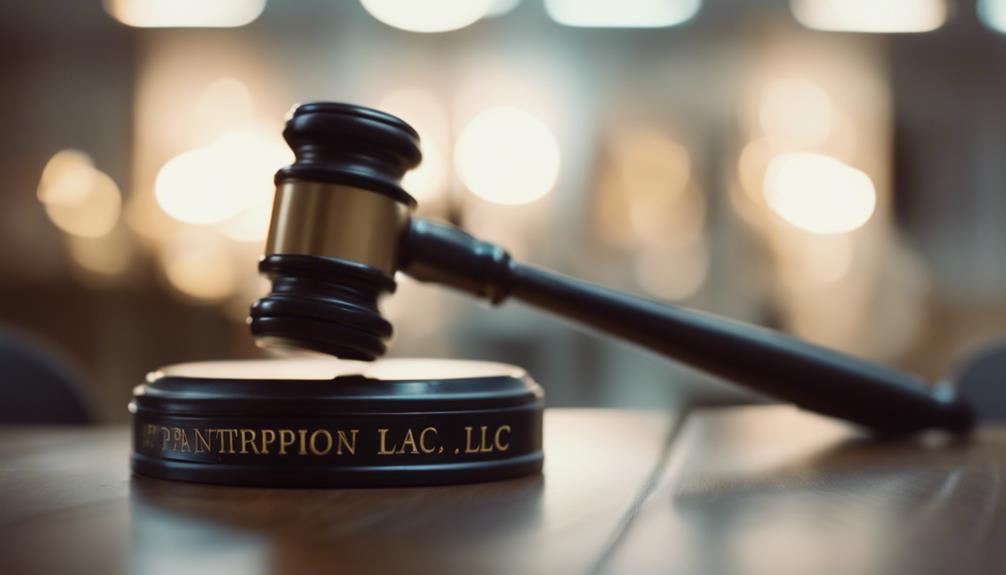When it comes to navigating the legal landscape of your business, understanding the ins and outs of company law is as crucial as having a compass in uncharted territory. From selecting the right legal structure to ensuring compliance with regulatory frameworks, the foundation of your business rests on solid legal ground.
But what about the intricacies of corporate governance or the nuances of contract law? Stay tuned to explore these essential company law basics that every business owner should be well-versed in to safeguard their venture's success.
Legal Structure Options

When choosing a legal structure for your business, consider the options available to determine the best fit for your needs. The most common legal structures include sole proprietorship, partnership, limited liability company (LLC), and corporation.
Sole proprietorship is the simplest form, where you're the sole owner and have full control over the business. Partnerships involve two or more individuals sharing ownership and responsibilities. An LLC provides limited liability protection to its owners, shielding personal assets from business debts. A corporation is a separate legal entity from its owners, offering the most protection but with more complex requirements.
Each legal structure comes with its own advantages and disadvantages. Sole proprietorships and partnerships offer simplicity but expose owners to personal liability. LLCs combine liability protection with flexibility in management. Corporations provide the highest level of protection but involve more formalities and paperwork.
Before deciding on a legal structure, carefully evaluate your business goals, risk tolerance, and long-term plans. Consulting with a legal or financial advisor can help you make an informed choice that aligns with your objectives.
Corporate Governance Essentials
Exploring the fundamental principles of corporate governance is essential for business owners seeking to establish effective decision-making structures within their organizations. Corporate governance encompasses the framework of rules, practices, and processes by which a company is directed and controlled. It involves defining the roles and responsibilities of the board of directors, management, and shareholders to ensure that the company's objectives are achieved in a transparent and ethical manner.
Key elements of corporate governance include accountability, transparency, fairness, and responsibility. By adhering to these principles, business owners can enhance the trust of stakeholders, improve organizational performance, and mitigate risks. Establishing clear lines of communication, implementing effective oversight mechanisms, and fostering a culture of integrity are crucial aspects of good corporate governance.
Moreover, business owners should strive to maintain a diverse and independent board of directors, conduct regular evaluations of board performance, and adhere to relevant laws and regulations. Prioritizing corporate governance sets the foundation for sustainable growth and long-term success in today's competitive business environment.
Shareholder Rights and Responsibilities

Understanding shareholder rights and responsibilities is crucial for business owners aiming to maintain transparency and accountability within their organizations. Shareholders hold ownership in the company and have the right to vote on important decisions, such as electing the board of directors or approving major corporate actions. As a business owner, it's essential to respect these rights and keep shareholders informed about key developments that may impact the company.
Moreover, shareholders also have the responsibility to act in the best interest of the company. This includes exercising their voting rights thoughtfully and participating in shareholder meetings to contribute to important discussions. By fulfilling their responsibilities, shareholders can help ensure the long-term success and sustainability of the business.
In addition, it's important for business owners to establish clear communication channels with shareholders to address any concerns or questions they may have. By fostering a positive relationship with shareholders and upholding their rights, business owners can create a culture of trust and collaboration within the company.
Compliance With Regulatory Requirements
To ensure the legal integrity of your business operations, it's imperative to comply with regulatory requirements set forth by relevant authorities. Regulatory requirements encompass a wide range of rules and standards that businesses must adhere to in order to operate lawfully. These requirements may include obtaining licenses and permits, adhering to environmental regulations, ensuring workplace safety standards, and protecting consumer data. Failure to comply with these regulations can result in severe consequences such as fines, legal action, or even the suspension of business activities.
It is essential to stay informed about the specific regulatory requirements that apply to your industry. This may involve regularly monitoring updates from regulatory bodies, seeking legal counsel when needed, and implementing robust compliance measures within your organization. By prioritizing compliance with regulatory requirements, you not only mitigate the risk of legal issues but also demonstrate your commitment to ethical business practices and responsible corporate citizenship. Remember, compliance isn't just a legal obligation; it's a fundamental aspect of maintaining trust with stakeholders and safeguarding the long-term success of your business.
Contract Law Fundamentals

As a business owner, understanding the fundamentals of contract law is crucial for protecting your interests and ensuring clear agreements with partners, suppliers, and clients. Contracts are legally binding agreements that outline the rights and obligations of the parties involved. To ensure your contracts are enforceable, it's essential to include key elements such as offer, acceptance, consideration, legality, capacity, and consent.
One fundamental aspect of contract law is the concept of offer and acceptance. This refers to one party proposing terms to another, who then agrees to those terms. Consideration is another vital element, where each party must give something of value for the contract to be valid. Additionally, contracts must be legal, involving lawful activities and not violating any laws or public policies.
Understanding these basics will help you draft contracts that protect your business interests and establish clear expectations with your partners, suppliers, and clients. It's advisable to seek legal guidance when creating important contracts to ensure they're legally sound and adequately protect your rights.
Frequently Asked Questions
How Can a Business Owner Protect Their Personal Assets From Company Liabilities?
To protect your personal assets from company liabilities, consider forming a limited liability company (LLC).
By doing this, you can separate your personal finances from those of the business, creating a legal barrier that shields your personal assets in case the company faces financial issues or lawsuits.
It's a smart move to safeguard your hard-earned money and investments while running your business with peace of mind.
What Are the Consequences of Not Properly Maintaining Corporate Records and Minutes?
If you neglect to maintain corporate records and minutes, you risk facing serious consequences. Failure to keep accurate records could lead to legal disputes, fines, or even the loss of your company's limited liability protection.
It's crucial to stay organized and comply with record-keeping requirements to safeguard your business interests and ensure compliance with the law. Keep your records up-to-date to avoid potential pitfalls down the road.
How Can a Shareholder Legally Challenge a Decision Made by the Board of Directors?
If you're a shareholder looking to legally challenge a decision made by the board of directors, you may need to review the company's bylaws and articles of incorporation.
Next, consult with a legal advisor to understand your rights and options.
Additionally, consider gathering support from other shareholders who share your concerns to strengthen your position.
What Steps Should a Business Take to Ensure Compliance With International Regulatory Requirements?
To ensure compliance with international regulatory requirements:
First, conduct thorough research to understand the specific laws that apply to your industry.
Next, establish clear policies and procedures that align with these regulations. Regularly review and update these guidelines to stay current with any changes.
Train your employees on these requirements and conduct regular audits to monitor compliance.
What Are the Key Elements to Include in a Contract to Ensure Enforceability and Protection for Both Parties?
When drafting a contract, make sure to include clear terms, such as the parties involved, obligations, payment details, deadlines, and dispute resolution mechanisms. Be specific about the scope of work and any limitations. Define what constitutes a breach and outline consequences.
Remember to include confidentiality clauses and specify the governing law. Consult with a legal professional to ensure your contract is comprehensive and legally binding for both parties.
Conclusion
Now that you have a better understanding of essential company law basics, you can make informed decisions to protect your business and ensure its success.
Remember to consider your legal structure options, adhere to corporate governance essentials, understand shareholder rights and responsibilities, stay compliant with regulatory requirements, and grasp contract law fundamentals.
By staying informed and proactive, you can navigate the legal aspects of running a business with confidence.










